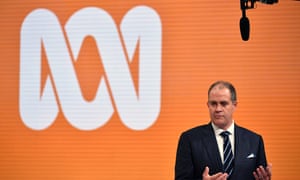Public broadcaster warns staff of more cuts in programs, services and jobs
The ABC has lost $783m in funding since the Coalition came to power in 2014, a new report on the accumulated impact of government cuts to the public broadcaster shows.
The summer bushfires meant the corporation has had to absorb an additional $3m in emergency broadcasting costs on top of an $84m indexation pause imposed by the then prime minister, Malcolm Turnbull, in 2018.
Despite a hiatus in implementing the 2018 budget cuts due to the Covid-19 pandemic, the ABC’s managing director, David Anderson, has warned staff he will unveil measures to meet the shortfall at the end of July.
“The important work we do continues,” he told staff last week. “Our teams are working towards the five-year strategy announcement and our plans to respond to the indexation pause. The board will consider these matters in coming months and I intend to come back to you by the end of July.”
More cuts to programming, services and jobs are expected in the next financial year despite six years of downsizing, including the loss of more than 1,000 jobs.
The budget cutbacks over three ABC triennial funding periods – the
current one ends in 2022 – have resulted in a significant reduction in
programming and services including the end of local sport on TV, Olympics on ABC radio and non-news television production outside Melbourne and Sydney.The summer bushfires meant the corporation has had to absorb an additional $3m in emergency broadcasting costs on top of an $84m indexation pause imposed by the then prime minister, Malcolm Turnbull, in 2018.
Despite a hiatus in implementing the 2018 budget cuts due to the Covid-19 pandemic, the ABC’s managing director, David Anderson, has warned staff he will unveil measures to meet the shortfall at the end of July.
“The important work we do continues,” he told staff last week. “Our teams are working towards the five-year strategy announcement and our plans to respond to the indexation pause. The board will consider these matters in coming months and I intend to come back to you by the end of July.”
More cuts to programming, services and jobs are expected in the next financial year despite six years of downsizing, including the loss of more than 1,000 jobs.
Five local newsrooms have closed as have most of the broadcast facilities in the smaller states, and shortwave radio in the Northern Territory has been shut down.
Programming cuts since Tony Abbott slashed $254m from the budget in 2014 – despite promising no cuts on the eve of the election – include the axing of Lateline after 27 years, the local editions of 7.30 and repeated cuts to Radio National specialist programming.
The report by independent think tank Per Capita for GetUp said there had been a 50% reduction in the number of hours of original Australian scripted (drama) content on ABC TV and a reduction in the recording and broadcast of live concerts on Classic FM.
In 2013-14, the ABC broadcast 101 hours of first-run Australian drama in prime time but by 2018-19, its total broadcast of scripted content, including comedy, was 50 hours.
The Coalition also withdrew funding for the international soft diplomacy arm of the ABC, the Australia Network, in 2014 and the ABC has closed or reduced operations of international bureaux in Tokyo, Bangkok, New Delhi and New Zealand.
The report’s author, the executive director of Per Capita, Emma Dawson, said the ABC was now operating with the smallest budget since the Howard government’s 2% funding cut in 1996 removed $55m from the ABC’s triennial funding, but with vastly more services.
The ABC never received any additional funding for its digital services which include iView, ABC Online and podcasting.
Dawson’s calculations, based on budget papers and Senate estimates, found the 2019-20 operational revenue of $879m represented a decrease in real funding of $367m per annum, or 29.5%, since 1985-86.
“While ruling out the privatisation of the ABC, as demanded by rank and file Liberal party members and the champions of free market fundamentalism who populate the ranks of its favoured thinktanks, the current government has instead pursued a policy of slowly eroding the ABC’s funding base and its capacity to meet its charter,” Dawson said.
“These repeated slices into the flesh of the ABC threaten to become a fatal wound. The loss of close to $800m in core funding in less than a decade leaves the ABC with no capacity to absorb further cuts, or to continue to invest in innovative new services to keep up with the demands of its audience.”
The figures correlate to what Anderson told senate estimates in March.
“It is important to remember that [the indexation pause] comes of top of $64 million of ongoing cuts that were imposed on the corporation in 2014,” Anderson said. “To summarise the ABC will have to absorb cumulative budget cuts that amount to $105.9 million per annum by the time we reach the 2022 financial year. This is an extraordinary strain on our ability to meet community expectations.
“At this point it is not possible to absorb further cuts without an impact on jobs and services.”
In 1987 an ABC marketing campaign under the then managing director, David Hill, famously boasted the public broadcaster cost each Australian just eight cents a day. In 1987 dollar terms that has been reduced to just four cents a day.

No comments:
Post a Comment